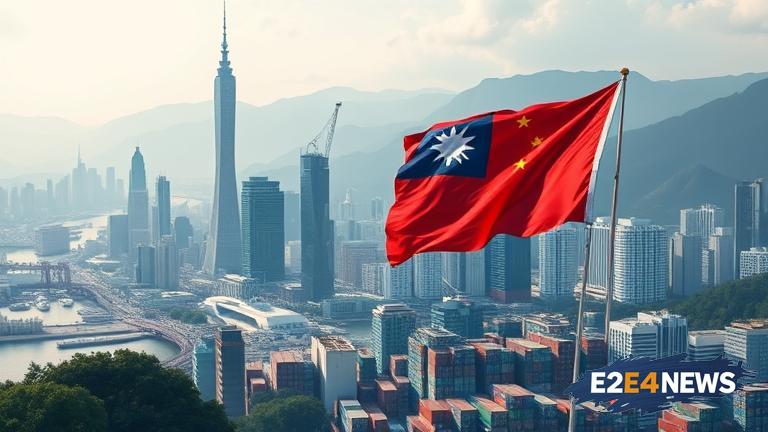The ongoing trade tensions between the US and China have had a significant impact on Taiwan’s export market. As a major manufacturing hub, Taiwan has been caught in the middle of the trade war, with many of its companies relying on exports to the US and China. The US-China trade war has led to a decline in Taiwan’s exports, with the island nation’s manufacturers facing significant challenges in terms of supply chain disruptions and tariffs. The trade war has also led to a decline in investor confidence, with many companies hesitant to invest in Taiwan due to the uncertainty surrounding the trade tensions. Despite these challenges, Taiwan’s government has been working to diversify the island nation’s economy and reduce its dependence on exports to the US and China. The government has been promoting the development of emerging industries such as artificial intelligence, biotechnology, and renewable energy. Additionally, Taiwan has been seeking to strengthen its trade relationships with other countries, including those in Southeast Asia and Europe. The US-China trade war has also led to an increase in production costs for Taiwanese manufacturers, with many companies facing higher costs for raw materials and components. This has made it difficult for Taiwanese companies to compete with their Chinese counterparts, who have been able to take advantage of the trade war to increase their market share. Furthermore, the trade war has also led to a decline in Taiwan’s economic growth, with the island nation’s GDP growth slowing down in recent years. The trade war has also had a significant impact on Taiwan’s technology sector, with many of the island nation’s tech companies relying on exports to the US and China. The trade war has led to a decline in demand for Taiwanese tech products, with many companies facing significant challenges in terms of sales and revenue. Despite these challenges, Taiwan’s tech sector remains a significant contributor to the island nation’s economy, with many companies continuing to innovate and develop new products. The trade war has also led to an increase in tensions between Taiwan and China, with the two sides engaging in a series of diplomatic and economic disputes. The trade war has also had a significant impact on Taiwan’s agricultural sector, with many of the island nation’s farmers facing significant challenges in terms of exports and sales. The trade war has led to a decline in demand for Taiwanese agricultural products, with many companies facing significant challenges in terms of revenue and profitability. Additionally, the trade war has also led to an increase in concerns about food security, with many Taiwanese consumers worried about the impact of the trade war on the island nation’s food supply. The trade war has also had a significant impact on Taiwan’s tourism sector, with many of the island nation’s tourist attractions and hotels facing significant challenges in terms of visitor numbers and revenue. The trade war has led to a decline in tourist arrivals, with many visitors canceling their trips to Taiwan due to the uncertainty surrounding the trade tensions. Despite these challenges, Taiwan’s government has been working to promote the island nation’s tourism sector, with many initiatives aimed at attracting more visitors and boosting revenue. The trade war has also led to an increase in concerns about the impact of the trade war on Taiwan’s economy and society, with many experts warning about the potential risks and challenges. The trade war has also had a significant impact on Taiwan’s relationships with other countries, with many nations seeking to strengthen their trade relationships with the island nation. The trade war has also led to an increase in tensions between Taiwan and the US, with the two sides engaging in a series of diplomatic and economic disputes. The trade war has also had a significant impact on Taiwan’s defense sector, with many of the island nation’s defense companies facing significant challenges in terms of sales and revenue. The trade war has led to a decline in demand for Taiwanese defense products, with many companies facing significant challenges in terms of revenue and profitability.





